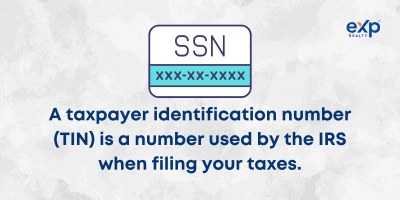The selling of property by foreigners is a common feature of real estate not just in the United States but all over the world. With markets more interconnected than ever, knowing how to sell a property as a foreigner is a must for anyone looking to make international investments. Whether you live in Mexico and want to buy real estate in Houston, TX, or you’re in Ireland and want a cabin in Appalachia, you’ll want to make some money off that investment one day. That’s why you need to know how to sell property in the U.S. as a foreigner.
First, you need a Taxpayer Identification Number

A taxpayer identification number (TIN) is a number used by the IRS when filing your taxes. It doesn’t matter if you’re a resident alien or a non-resident alien, you still need to have a TIN. A TIN can be many different things, a social security number or an employee identification number for instance. You can apply for TINs by filling out forms from the IRS. Without TIN you cannot sell property in the U.S. as a foreigner. For more information, check out the IRS’s website which has links to apply for a TIN.
Resident Alien Vs. Non-Resident Alien
Now that you have your TIN, selling a property will go differently depending on whether you’re a non-resident alien or a resident alien. Let’s review the difference.
A resident alien is a foreigner living in the U.S. with either a permanent resident card (green card) or is considered substantially present. To qualify for substantial presence, you need to have been in the U.S.
- 31 days during the current year, and
- 183 days during the 3-year period that includes the current year and the 2 years immediately before that, counting:
-
- All the days you were present in the current year, and
- 1/3 of the days you were present in the first year before the current year, and
- 1/6 of the days you were present in the second year before the current year.
If you either don’t have a green card or do not qualify as substantially present, you are considered a non-resident alien. That does not disqualify you from selling property in the U.S. as a foreigner, it just changes the process somewhat.
Whether Resident or Non-Resident, Get An Agent
Foreigners selling property in the U.S. need real estate agents just as much as citizens, if not more so. A real estate agent will help you optimize your listing for the local market. They’ll know when it is best for you to sell and they’ll be able to put you in contact with the best lawyers and title companies, which you’ll need when selling your home. If you’re not currently residing in the U.S. or in the home you’re selling, you especially want an agent in-country who will be on hand when stumbling blocks arise in the home-selling process. Time zones and language barriers do not make for easy deals.
We recommend you get a real estate agent with CIPS certification. CIPS, Certified International Property Specialist Designation, is a special certification that real estate agents can get after completing coursework that will prepare them for helping foreigners to buy and sell real estate. Not only are CIPS realtors better prepared for helping you sell property in the U.S. as a foreigner, they’re also part of a network of other CIPS realtors that can help make your home-selling process as effortless as possible
How To Sell Property in the U.S. As A Resident Alien
To both buy and sell property in the U.S. as a Resident Alien, you’ll follow the same process and tax laws as U.S. citizens. You’ll have to pay capital gains tax to the U.S. government, and probably similar taxes to your own home government as well.
What are capital gains taxes?

When you sell an asset in the U.S., such as stocks, a car, or a house, you have to pay a fee if the profit from the sale is greater than the cost of purchasing the asset in the first place. This fee can be anywhere from 15% to 30% on the sale. Now there are some exemptions.
If the home you’re selling is your primary residence and you have lived in that home for at least two years preceding the sale, up to $250K of whatever profit you make from the house can be tax deductible ($500K if you file jointly with your spouse). This is called the main home sale exclusion. If you did not make a profit from selling your home (if you made a loss) and you can prove that, you can also be exempt from paying capital gains tax.
If there are extenuating circumstances that have caused you to sell your home, such as health-related issues, change of employment, etc, you can apply and qualify for a reduced exclusion from the gain on the sale of a home that would trigger a capital gains tax.
How to Sell Property in the U.S. as a Non-Resident Alien

If you’re selling property in the U.S. as a non-resident alien, you don’t have to pay a capital gains tax. Instead, the buyer will withhold 15% of the purchasing funds and send that 15% to the IRS as a form of income tax on the disposition of your property. This falls under the Foreign Investment in Real Property Tax Act of 1980, which affects all non-resident foreigners selling property in the U.S.
In this case, it’s up to the buyer to withhold the funds and send them to the IRS, not the seller. There are some exemptions that a non-resident alien seller can petition the IRS for, such as an exemption from having the 15% withheld if the profits realized from the transaction are less than $300K. To successfully receive any exemption from the IRS, be prepared to fill out the necessary paperwork several months in advance. For a look at some of these exceptions, check out the IRS’s website.
How To Sell Property in the U.S. As A Foreigner
The true hurdles of selling property in the U.S. as a foreigner depend on whether you’re selling that property for profit’s sake, or if that profit is just a byproduct of you moving from one home to another i.e. are you selling for business or for life? For resident aliens, getting into real estate as a business decision will be much easier than for non-residents thanks to the ease with which you can avoid capital gains taxes. It’s important to know where you stand in the eyes of the IRS and use an agent to help you easily, efficiently, and legally sell property in the U.S. as a foreigner. Now that you know how to sell a property in the US, do you keep all the money after selling a property? Read our guide to have an idea of where your money is going and why it isn’t all going to you.





